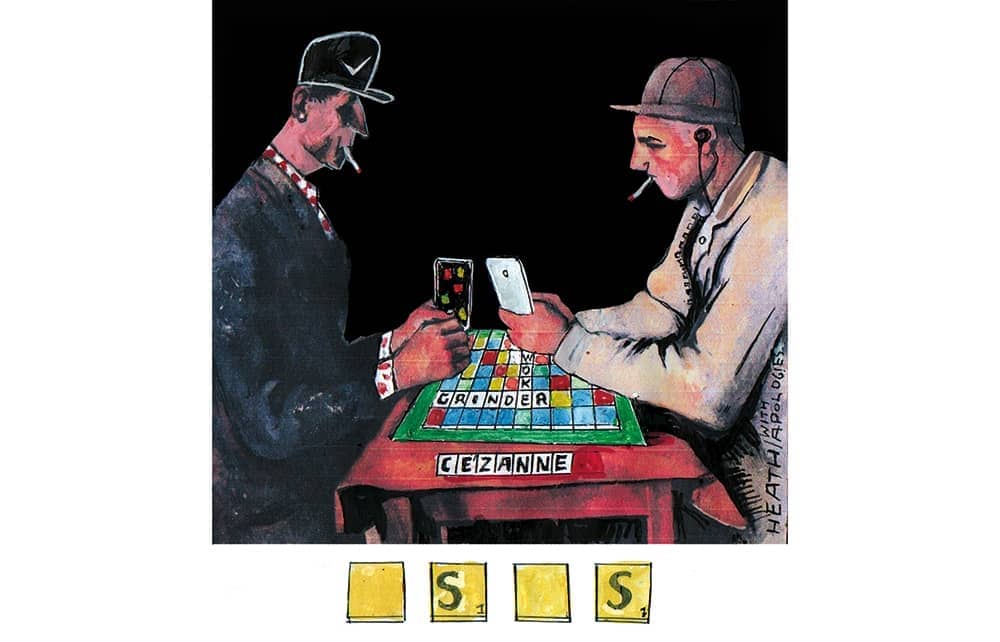When you’re playing a word game, don’t you sometimes feel how horribly unfair it is that players who know more words prosper? Wouldn’t it be better to have word games that didn’t rely so heavily on knowledge of the dictionary, that weren’t so, y’know, wordy? And, come to that, wouldn’t a kindler, gentler sort of word game be, like, collaborative – so that players helped each-other to celebrate their diversity rather than competing to, ugh, ‘win’?
This upside-down is a game which will bear the same relationship to Scrabble that tennis does to Junior Bake-Off
Mattel has you covered. The company has announced that Scrabble sets will now have double-sided boards. On the obverse of the traditional boards, with their intimidating triple-word score squares and requirement to know words like ‘XI’, ‘XU’, ‘QI’ and ‘QAT’, will be ‘Scrabble Together’, a game ‘designed with inclusivity and collaboration in mind’: ‘a collaborative, faster-paced version of the iconic word game to make gameplay more accessible for anyone who finds word games intimidating’. It stressed ‘teamwork’ and ‘collaboration’.
Which, obviously, yuk. That said, we should keep a sense of perspective. The Woke Mob™ has not, in fact, come for the freeborn Englishman’s love of this traditional word game. They haven’t abolished normal Scrabble. They have simply introduced – in the manner of the reverse side of the Dungeons and Dragons board in Stranger Things – an ‘upside-down’. This upside-down is a game which will bear the same relationship to Scrabble that tennis does to Junior Bake-Off, which is to say none at all.
Being competitive is the whole joy of Scrabble. Indeed, the fact that Scrabble, unlike that horrible game chess, has a significant element of luck in it, makes the competitive element more democratic. In his excellent account of the competitive Scrabble circuit, Word Freak, Stefan Fatsis describes his surprise at winning his first game against one of the best players in the world: every dog, on the Scrabble board, has his day. The pleasure in the game is making the most of it.
In the slightly annoying app which seems to be the only way to play Scrabble online these days, the chat function gives you a handful of custom emojis you can use. Not one of them seems to me to signify ‘well played, old chap’: they divide evenly between wailing and gnashing of teeth, and gloating. My favourite, to be used unfailingly after you have placed a seven-letter ‘bingo’, is a cheerful little creature wearing sunglasses and doing finger-guns.
Once a year, I play Scrabble in person with my friends Hugo Rifkind and Jenny Colgan. The former is a writer for the Times and the latter a novelist, and by any metric you care to choose both are vastly more successful than I am. You can absolutely bet that whipping them on the Scrabble board most years is a central pillar of the collapsing tent of my self-esteem. Likewise, I look at Tom Holland’s world-conquering career as a popular-but-still-academically-respectable historian, top-of-the-charts podcaster and revered amateur cricketer… and take comfort in reminding myself that he once used two blanks to play the word ‘BANANA’.
So, non-competitive Scrabble will be like a ‘fair and balanced’ Fox News: a giant missing of the point. But it will also, I think, have the unintended effect of making Scrabble still more competitive and divisive. Lionel Shriver’s new novel Mania imagines a world in which diversity and inclusion is taken so far that it’s considered bigoted to discriminate against stupid people, and ‘the d-word’ (i.e. ‘dumb’) is a slur. I bet she regrets that it went to print before ‘Scrabble Together’ came into existence.
‘We went round to so-and-so’s house for dinner,’ you will whisper bitchily to a friend, ‘And they used the other side of the Scrabble board!’ Everyone will know what you mean.







Comments